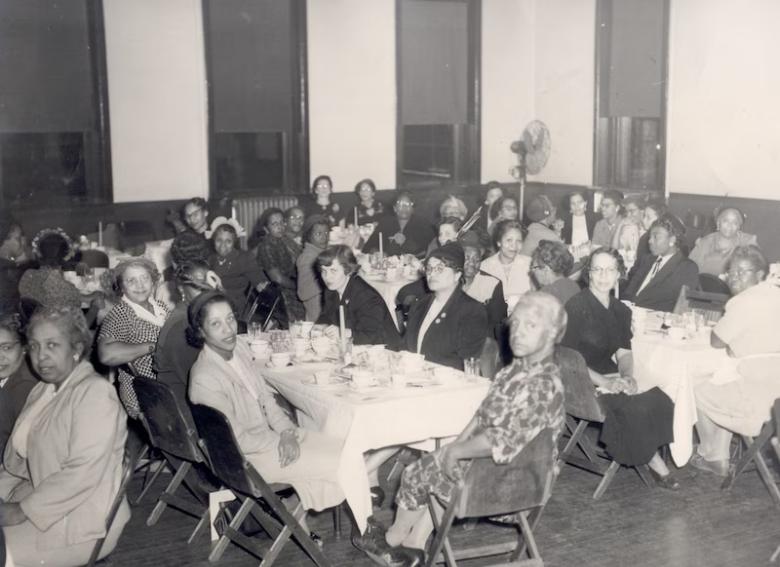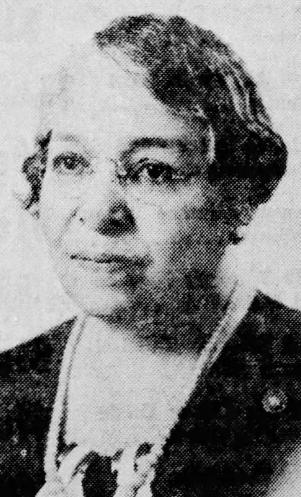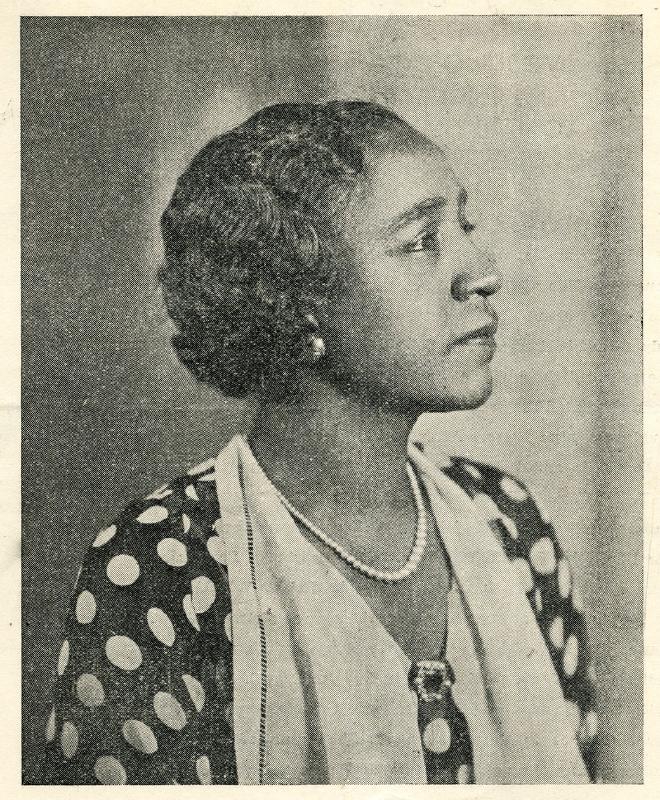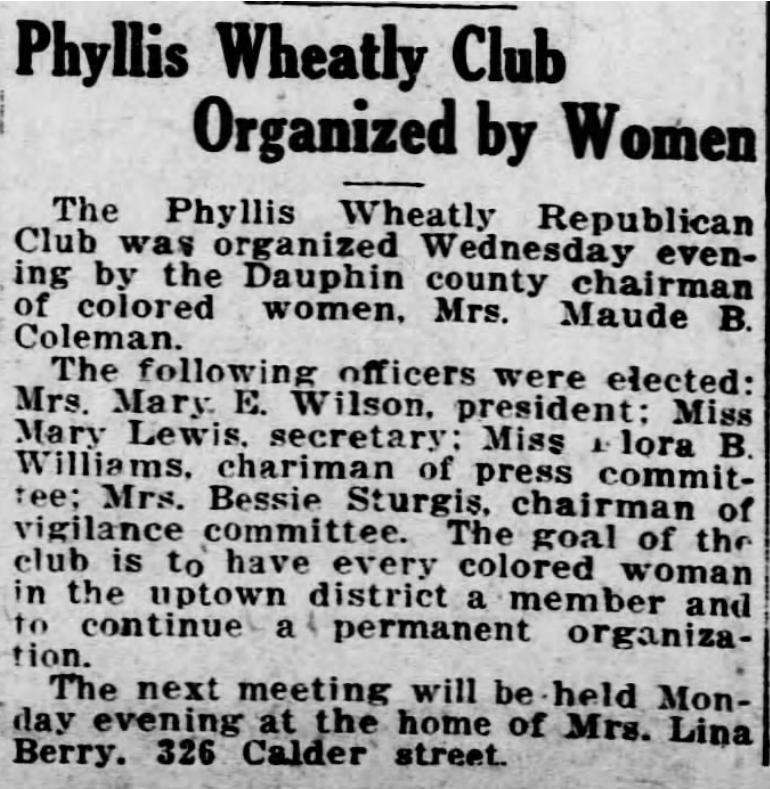The Phyllis Wheatley YWCA
Black Women Activists of Twentieth-Century Harrisburg
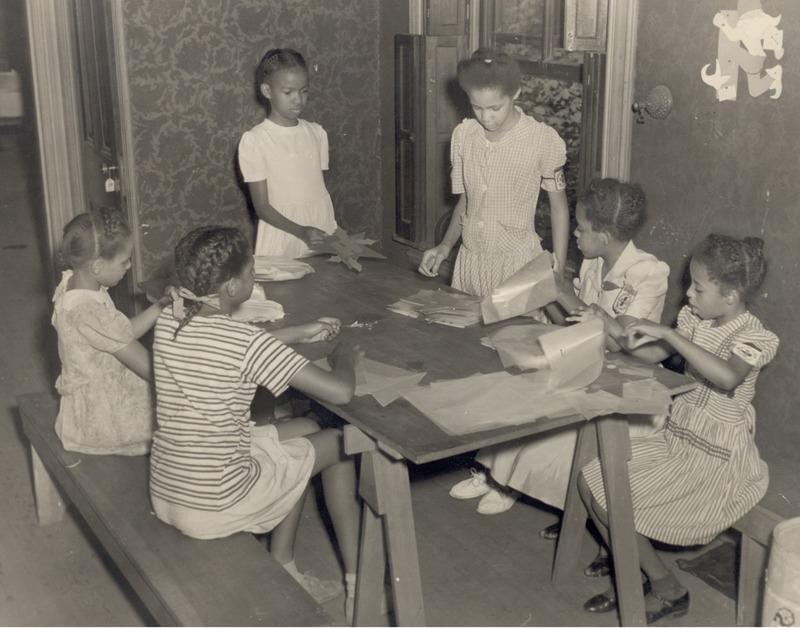
The Young Women’s Christian Association, or YWCA, has been active in Harrisburg since 1894. The organization offered language and dance classes, as well as affordable housing, to local (White) women. In 1920, a new branch of the YWCA opened–the Phyllis Wheatley branch–dedicated specifically to addressing the needs of Harrisburg’s Black women.
On a street corner that no longer exists, Cowden and Briggs, stood the Odd Fellows building, owned by the Odd Fellows Fraternal Order, with a large room that served as the Phyllis Wheatly branch of the YWCA, Young Women’s Christian Association. Next door sat a house owned by the YWCA with sleeping facilities available for the women. The YWCA, and nearby YMCA, represented a primary social center of the Black community in the 1920s and 1930s, hosting concerts, clubs, and events available to the local children and adults.
The Phyllis Wheatley Branch of the nation-wide YWCA was organized in Harrisburg, Pennsylvania on April 1, 1920. It began with 123 members, a number that would flourish as the community took advantage of the resources and programs offered. The Phyllis Wheatley branch, alongside the Forster Street YMCA, was formed from the War Camp Community Service that had provided for World War I soldiers. According to news editor Joe McClure, the Harrisburg YWCA was dedicated to the “recreational, educational, social and religious development of Black women and girls.” The Phyllis Wheatley YWCA branch was a center for solidarity, camaraderie, and served as a safe haven for many Black women. The YWCA helped the region’s Black community in combating white nationalism, promoting activism, and providing a place for youth to grow through its after school programs.
The Phyllis Wheatley YWCA was a refuge with educational programs, home assistance, and spaces for women to be cared for and respected. The branch was named after Phyllis Wheatley, the famous Black poet (1753-1784) who wrote of the challenges she faced during her enslavement. She embraced her Christian faith alongside her African identity as an American struggling in a new world. The Phyllis Wheatley branch was named in her honor due to her inspiration for the Black community and the YWCA’s mission of empowerment.
The Phyllis Wheatley branch developed under the direction of numerous influential leaders throughout the twentieth century, the primary being Mrs. Maude Coleman (1882-1954). Maude Coleman (née Deering), married to John W. Coleman, was born in Virginia but fled the south, becoming a waitress in Harrisburg before the couple moved to Seattle from 1911-1919. During her time in Seattle, Coleman gained significant experience with the YWCA and its role in political and social service. She reportedly received social work training from the University of Washington before they returned to Pennsylvania. Coleman’s experience and training from Seattle allowed her “to secure a position as the first executive secretary of Harrisburg’s newly opened Phyllis Wheatley YWCA” (Streeter). Once there, she created basketball teams and gymnastics classes for young girls, formed a storytelling club, and “arranged for a local lawyer to teach classes in citizenship, a move that coincided with women’s newly ratified right to vote” (Streeter). Coleman wanted to provide safety to women within the Harrisburg community and fought to combat racial discrimination and promote resilience. Coleman was recognized for her service through her appointment as a special representative of the Pennsylvania Department of Welfare in 1924 by Governor Gifford Pinchot (s. 1923-1927; 1931-1935).
Another influential woman, Ella Frazier (1886-1977), came to Harrisburg in 1923 and became the second executive director of the YWCA Phyllis Wheatley branch. Frazier entered neighboring communities, promoting the YWCA to any young women she could find. She encouraged young women to become involved in “productive activities” emphasizing etiquette and skills that would provide employment opportunities for women. Mr. Quann, a member of the YMCA, remembered Ella Frazier as “the driving force behind the YWCA” and said, “she kept that organization going and going and going” (7). Ella Frazier was an impactful member of the YWCA, driven to support and assist as many young women of the community as possible, dedicating 32 years to the YWCA mission before retiring in 1955.
The Phyllis Wheatley YWCA was a prominent feature in the Harrisburg community that impacted the members through the attention given to educational, social, and political aspects of life. An announcement published on January 14th, 1930 in The Evening News, a local newspaper, lists classes that the YWCA offered to the community including sewing, gymnasium, glee club, piano class, arts and crafts, Bible study class, and home nursing. Additionally, the YWCA hosted events throughout the year including an annual Christmas dinner and program and a “Hanging of the Greens” for younger groups to celebrate the Christmas season. One highlight of the social events was the formal dance hosted by the Phyllis Wheatley YWCA and the Forster Street YMCA. Mr. Robert Quann, a Harrisburg resident in the 1920s, reflected on the formal dances where “you always gave your girl a corsage, you just had to do that and you had to wear a boutonniere…and you just couldn’t be dressed wrong, not for that.” The YWCA and YMCA were committed to supporting the lives of their community and providing opportunities for people to improve all aspects of their lives.
Frazier’s retirement coincided with the relocation of the Phyllis Wheatley branch to the main branch after the original building was demolished in 1954 along with Maude Coleman’s home as part of the second Capitol Extension. In an effort to make more space for the Capitol complex, the state government repossessed buildings, including residences and community centers, against the protests of Harrisburg citizens and organizations. The Health and Welfare building was added in the 1950s where the Odd Fellows Hall once stood after its forced seizure.
Today, the YWCA serves the area with a focus on “economic development, veterans services and violence prevention,” and committed itself to a core mission “to empower women and eliminate racism.” Additionally, the YWCA aims to help victims of human trafficking through grant funding from the United States Department of Justice. The US Attorney David J. Freed wrote about the YWCA:
“Over the course of my career in public service, I have had the opportunity to work together with the dedicated staff at the YWCA of Harrisburg on behalf of victims of Domestic Violence, Sexual Assault, Human Trafficking and Stalking…With a small staff and a limited budget, the YWCA provides direct services and advocacy to some of our most vulnerable citizens.”
Because of the dedication and hard work of the founders, leaders, and organization members, the YWCA Greater Harrisburg has created a lasting impact on the Pennsylvania community and continues to honor Phyllis Wheatley and her inspiring legacy.
A full list of the resources used in this story can be found here.
Related Stories
The Second Capitol Extension of Harrisburg, Pennsylvania
Images

